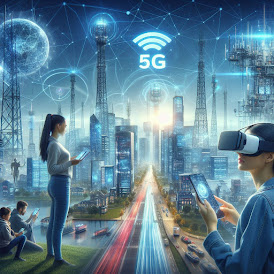Unveiling the Future: The Revolutionary Impact of 5G Technology
- Get link
- X
- Other Apps
5G technologies:
 |
| 5G technologies |
A New Era of Connectivity:
5G technology heralds a new era of ultra-fast internet speeds, significantly lower latency, and unparalleled reliability. With the potential to reach speeds up to 100 times faster than 4G, 5G is set to transform the way we interact with the digital world. Imagine downloading a full-length HD movie in mere seconds or streaming high-resolution virtual reality content without a glitch – 5G makes this a reality.
The Backbone of Modern Industries:
The impact of 5G extends far beyond personal convenience; it is poised to be the backbone of modern industries. In healthcare, 5G can enable real-time remote monitoring and telemedicine, providing critical care in the most remote locations. For the automotive industry, the reduced latency of 5G is crucial for the development of autonomous vehicles, where every millisecond counts for safety and precision.
Catalyzing the Fourth Industrial Revolution:
5G is the catalyst for the Fourth Industrial Revolution, powering innovations such as the Internet of Things (IoT), artificial intelligence (AI), and robotics. With its ability to support a massive number of connected devices simultaneously, 5G will facilitate smart cities, where everything from traffic lights to utility services can be optimized for efficiency and sustainability.
Economic Implications:
The economic implications of 5G are staggering. It is estimated that by 2035, 5G could generate $13.2 trillion in global economic value and create 22.3 million jobs in the 5G global value chain. This technology is not just an upgrade: it is an economic engine that will drive growth and innovation for decades to come.
Embracing the Change:
As we stand on the cusp of this technological revolution, it is imperative for businesses, governments, and individuals must embrace the change. The deployment of 5G networks will require collaboration and a forward-thinking mindset to fully harness its potential.
Conclusion:
The impact of 5G technology is vast and multifaceted. It is more than just a new generation of connectivity; it is a transformative force that will shape the future of our society. As we venture into this uncharted territory, one thing is certain, the world as we know it is about to get a whole lot faster, smarter, and more connected.
- Get link
- X
- Other Apps



Comments
Post a Comment